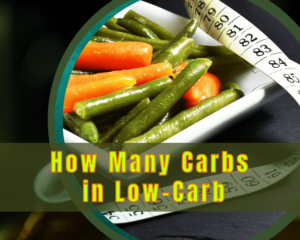
How Many Carbs Are in a Low-Carb Diet? Let’s Take a Look.

Disclosure: You should be aware that some of the links in this article may be affiliate links, which means that if you decide to buy something through one of these links, I may receive a commission, which does not increase the cost to you. This site does not provide financial or medical advice and is just for entertainment purposes. In our privacy policy, you may see our affiliate disclosure.
Understanding the basics of a low-carb diet
Just how many carbs are in a low-carb diet anyway? This is the question that often floats around. This is a difficult question to answer for many since most people aren’t aware of how many carbs they consume on a daily basis.
When it comes to counting anything to do with our diet, it is most likely calories. The answer has a lot to do with your goal and what it is you are trying to accomplish through a low-carb, high-fat diet.
Carb counting is a crucial aspect of a low-carb diet for individuals looking to manage their carbohydrate intake effectively. By understanding how many carbs are in the foods they consume, people can make informed choices about what they eat and maintain their desired level of carb consumption.
However, it’s important to recognize that not all carbs are created equal. Instead of focusing solely on the quantity of carbohydrates ingested, it is equally essential to consider the quality of these carbohydrates.
A low-carb diet encourages the consumption of complex carbs rather than simple ones. While simple carbohydrates like sugar and refined grains can cause blood sugar spikes and subsequent crashes, complex carbohydrates provide more sustained energy without these adverse effects.
Emphasizing whole fruits, vegetables, legumes, and whole grains instead of processed or sugary foods allows individuals following a low-carb diet to receive essential nutrients while minimizing excessive carb intake.
Carb counting is an essential tool for those on a low-carb diet, as it helps manage carbohydrate consumption effectively. Nonetheless, focusing on quality rather than just quantity is also critical for overall health benefits.
By recognizing that not all carbs are equal and prioritizing complex carbohydrates over processed or sugary options, individuals can optimize their nutrient intake while still adhering to the principles of a low-carb lifestyle.

Table of Contents
Defining carbohydrates: what are they exactly?
Carbohydrates, along with protein and fat, are a type of macronutrient that provides energy to the body. Sugars, starches, and fibers are all examples; they all contain carbon, hydrogen, and oxygen atoms.
Based on their molecular makeup, carbohydrates can be broken down into two additional groups: simple carbohydrates and complex carbohydrates.
The body converts simple carbohydrates into glucose quickly. Fruits, milk, and sugar are good examples of foods that contain them.
However, complex carbohydrates take longer to digest because they are made up of longer chains of sugar molecules. Whole grains, like brown rice and whole wheat bread, are excellent sources of these types of carbohydrates.
Keep in mind that the nutritional value of different types of carbohydrates varies greatly. White bread and sugary drinks are examples of refined or processed simple carbohydrates.
Unrefined or complex carbohydrates, on the other hand, are a better choice because they contain more fiber and other healthful components.
Carbohydrates are a necessary macronutrient, but eating too many of them can have unintended consequences like weight gain or blood sugar swings, so moderation is key.
Knowing that carbohydrates are complex molecules with carbon, hydrogen, and oxygen allows us to make better dietary decisions.
Choosing whole, nutrient-dense carbs over processed ones has long-term positive effects on health and helps maintain consistent energy levels.

What is considered a low-carb diet?
Those who follow a low-carb diet typically avoid foods high in carbohydrates, such as grains, starchy vegetables, and sugary treats.
Consuming less than 130 grams of carbohydrates per day is indicative of a low-carb diet, though this number is not set in stone. However, some people may choose even lower targets, with a daily intake of 20-30 grams being typical.
A low-carb diet differs from standard eating plans in that it encourages higher intakes of protein and healthy fats. Those who want to lose weight while maintaining their muscle mass adhere to low-carb diets, which replace carbohydrates with foods high in protein and fat like lean meats, fish, and nuts.
This way of eating has additional benefits, including lowering sugar cravings and maintaining healthy blood sugar levels.
The adaptability of a low-carb diet to different tastes and health objectives is a major benefit. Those trying to lose weight may find success with a more moderate strategy that allows for a higher total daily carbohydrate intake in exchange for increased physical activity.
However, very low-carbohydrate diets can boost fat-burning and insulin sensitivity, making them attractive to those seeking rapid weight loss or those managing conditions like diabetes.
Finding the optimal level of carbohydrate consumption while adhering to a low-carb diet requires first and foremost an awareness of one’s individual needs and a willingness to adapt to those needs as one progresses.
How many carbs should you consume on a low-carb diet?
Determining the appropriate daily carb intake for a low-carb diet can be a perplexing task.
While there is no one-size-fits-all answer, it is generally recommended to consume fewer than 50 grams of carbs per day to achieve ketosis.
However, individual factors such as activity level, body composition, and metabolism should also be taken into consideration.
It’s important to note that not all carbs are created equal. Rather than fixating solely on the total carb count, focusing on the quality of carbohydrates consumed can have a significant impact on your low-carb journey.
Opting for nutrient-dense carbohydrates like leafy greens and non-starchy vegetables allows you to enjoy more volume while keeping your carb intake in check.
Cruciferous vegetables like brussel sprouts, broccoli, and cauliflower are excellent options to consider as well.
Additionally, it is crucial to listen to your body when determining your daily carb limit. Some individuals may thrive with higher carbohydrate intakes, especially athletes or those engaging in rigorous physical activities.
Experimenting with different levels of carbs within the low-carb spectrum can help you find what works best for your unique physiology and overall well-being. Always remember: sustainable long-term results come from finding a balance that nourishes both body and mind.
The benefits of a low-carb diet
The low-carb diet has become increasingly popular due to its numerous health benefits. A significant benefit is the potential for weight loss.
By reducing carbohydrate consumption and focusing on healthy fat sources that are high in protein, individuals have a greater chance of losing fat mass while maintaining muscle mass.
This is so that the body can easily convert carbohydrates into glucose, its primary fuel source. When they are absent, the body transitions to utilizing stored fat for energy, resulting in an enhanced fat-burning mechanism.
A low-carb diet can aid in diabetes management and blood sugar regulation. The body breaks down carbohydrates into sugars, which then enter the bloodstream and raise blood sugar levels.
People with diabetes can exert greater control over their day-to-day blood sugar fluctuations by limiting their consumption of carbohydrates, especially those derived from refined sources such as white bread and sugary beverages. This not only facilitates the maintenance of consistent energy levels but also enhances the long-term management of the condition.
Alongside weight loss and regulation of blood sugar, adherence to a low-carb diet has the potential to enhance cardiovascular health.
According to research, adhering to this dietary regimen may result in reduced triglyceride levels (a form of fat that has been associated with cardiovascular disease) and elevated HDL cholesterol (good cholesterol) levels.
A low-carb diet helps individuals substantially lower their risk of cardiovascular disease by substituting refined carbohydrates with nutrient-dense foods, including vegetables, lean proteins, and healthy fats like avocados or olive oil.
Potential risks and challenges of a low-carb diet
The potential for low-carb diets to aid in weight loss has led to their increased popularity, but these diets are not without their risks. A lack of essential nutrients is a major concern, as the elimination of carbohydrates also means giving up numerous healthy food options.
Whole grains, fruits, and some vegetables are all examples of carbohydrate-rich foods that are high in essential nutrients and good for your health as a whole. Constipation and other digestive problems are linked to insufficient dietary fiber.
The potential disadvantages of a low-carb diet on energy and athletic performance is another difficulty. Due to their rapid conversion into glucose, carbohydrates are the body’s preferred source of fuel during exercise.
People’s stamina and endurance may suffer if they drastically reduce their carbohydrate intake and participate in strenuous physical activity. In high-intensity activities where carbohydrates are a primary source of energy, this could be detrimental.
Some people experience the ketogenic flu when switching to a low-carb diet. This condition, which results from the sudden depletion of glycogen stores in muscles, can cause fatigue, fuzzy thinking, and headaches that can last for up to a week.
Because of this, it’s important to think about how to modify a low-carb diet in order to reduce the associated risks, such as eating more colorful vegetables and nuts and seeds for protein. Any potential dietary shift should be approached with moderation.
Summary - finding the right balance for you
If you’re trying to lose weight or improve your health, you need to know how many carbohydrates are in a low-carbohydrate diet.
While there is no universally accepted answer, many experts agree that sticking to a carb intake of 100 grams or less per day is necessary to reap the health benefits of the ketogenic diet.
Keep in mind that not all carbohydrates are the same and that quality and source are just as important as total intake when it comes to achieving your goals.
If you need help figuring out how many carbohydrates are right for you, talk to your doctor or a registered dietitian.
If you’re thinking about going on a low-carb diet or you just want to start picking healthier-carb options, it’s important to educate yourself on nutrition.
Table of Contents


How Many Carbs in a Low-Carb Diet Is Ideal?

Jumpstart Your Journey: Starting a Low-Carb Diet 101

Keto and Intermittent Fasting Combo for Weight Loss

The Big Question About the Keto Diet for Weight Loss

How to Stay Low Carb During the Holidays

An Easy Low-Carb Meal Plan for Fat Loss

Mindful Eating: Key to Your Keto Diet During the Holidays

Your Ultimate Guide to the Best Keto Vegetables

What happens when you eat a low-carb high-fat diet?

How Many Carbs Are in a Low-Carb Diet? Let’s Take a Look.

Top Tips for Fast and Effective Weight Loss
Disclosure: You should be aware that some of the links in this article may be affiliate links, which means that if you decide to buy something through one of these links, I may receive a commission, which does not increase the cost to you. This site does not provide financial or medical advice and is just for entertainment purposes. In our privacy policy, you may see our affiliate disclosure..







